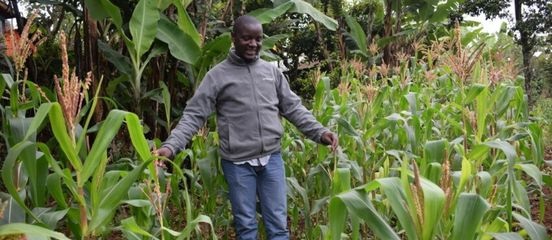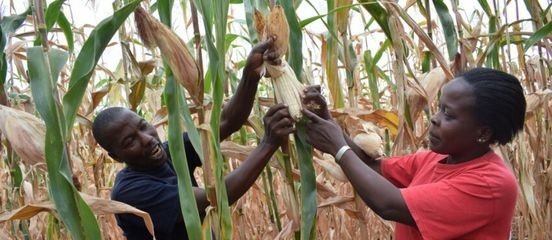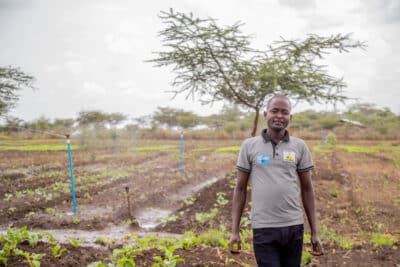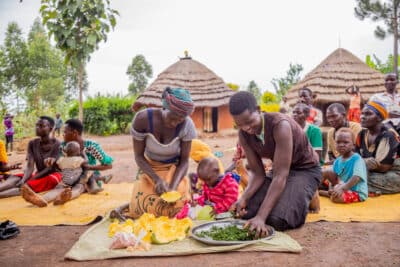News
9 August 2022
Restoring soil health in Kenya

Farm Africa supported smallholder farmers in semi-arid areas of Embu County, Kenya to strengthen food security through regenerative agriculture.
The majority of the population in Embu County, Kenya, earn a living through crop production and livestock keeping. However, livelihoods from farming are far from secure. Agricultural production and food security are increasingly under threat in Kenya’s highlands, burdened by risks such as climate change as well as soil degradation caused by overgrazing, overcropping and poor farming practices.
Regenerative agriculture involves farming practices that rejuvenate soil fertility and reduce carbon emissions. Funded by the IKEA Foundation through the Alliance for a Green Revolution in Africa (AGRA), Farm Africa worked with 10,239 farmers (including 6,760 women) in Embu to adopt regenerative agricultural technologies and practices to grow maize and pulses.
Running from July 2020 to October 2021, the project aimed to increase food security as well as the resilience of local farmers to climate change through the promotion of regenerative agriculture practices.
The project directly reached 50 farmer groups who are now more resilient to climate change, have assured food security and improved incomes.

BRIDGING AGRICULTURAL EXTENSION SERVICES
In Kenya, agricultural expertise is shared with farmers via a network of extension workers. Unfortunately, this system is overstretched, with the ratio of extension workers to farmers being 1:200. To help overcome this shortfall, Farm Africa utilised the Village Based Advisors (VBA) model.
Regenerative agriculture was taught at the community level by 137 VBAs: a network of private sector local farmers who supply information services and high-quality agricultural inputs such as certified seeds to other farmers. Of these 137 VBAs, 89 were female.
A technical curriculum in good agricultural practices for regenerative agriculture was developed, promoting an inter-cropping system of maize and high yielding, nitrogen fixing bush beans alongside agroforestry crops to improve soil fertility and provide staking material for the bush beans. Training was delivered to the VBAs and to 45 government agricultural officers.
IMPROVING BUSINESS
As well as providing advice on agronomy, the VBAs played a critical role in enabling farmers to boost their incomes by developing links to markets where they could sell their produce.
A total of 20 aggregation centres were established to enable farmers to sell their produce together in bulk. Farm Africa offered training to ten aggregators, developing marketing strategies and production plans that provide direction on markets and prices, as well as available quantities of produce. This was to ensure the sustainability of the aggregation centres. The VBAs helped connect farmers’ groups to financial services providers to gain access to credit to invest in their businesses.
VBAs were also contracted directly by traders to recruit farmers, which helped to increase the acceptance of the VBA model in the farming community. By developing links to markets and advising on which crops to grow, for example soya beans, the VBAs helped farmers grow crops that were high in demand.
Through the VBAs, Farm Africa introduced digital platforms to help with both farming and marketing. These included AGRIBOT (an online digital extension platform managed by Microsoft through AGRA) and AGRIVIEW, a digital marketing platform.

IMPROVED REGENERATIVE AGRICULTURE PRACTICES
A score card survey evaluating the uptake rate of regenerative practices found that 97% of 412 farmers surveyed are now applying organic manure to their farms. Prior to the project’s start, only 59% were using manure on their maize and pulse crops. Of that 97%, the majority highlighted an increased crop yield as a major benefit of using manure.
The majority of farmers (77%) have practised mulching since the project’s inception, a 44% growth compared to before the project. The benefits of mulching include higher water retention by soils and a reduced need for weeding. The number of farmers practising minimum tillage almost doubled, from 46% to 84%. As a result, farmers saw an improvement in soil fertility and texture and a reduction in instances of soil erosion.
In addition to farmers’ productivity increasing, analysis of soil samples revealed that soil health had improved, with higher pH levels recorded, as well as improved levels of nutrients such as zinc and phosphorous on some farms.
Farm Africa and AGRA are now planning a new project to scale up the uptake of regenerative agriculture in Embu as well as in a second county, Tharaka-Nithi, between 2022 and 2025.
This story is from Farm Africa’s 2021 annual review. Find more case studies from our projects and download our annual review here.




